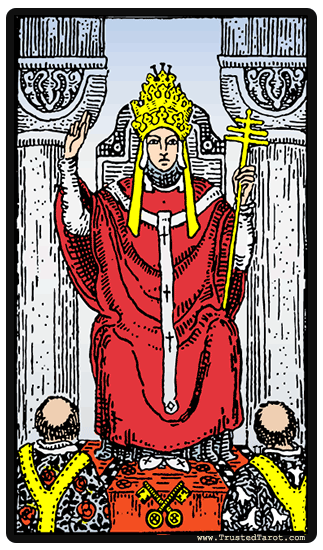The Heirophant (Pope)
Approval · Conformity · Consent · Good advice · Marriage or Union

The Heirophant (Pope) Tarot card
The Heirophant (Pope)'s Meaning
Depending on your own nature, the Heirophant can mean very different things. At its root, it represents doctrine, but doctrine can come in the form of teaching and guidance or rigid authority. Where it appears in your spread is also important, as it is most often indicative of your own approach to the moral, religious, and social conventions of the world. Considered wisely, it helps show the path towards fulfillment.
Past
There is value in an ambition from your past. Look to a strength that you may have neglected.
Present
The opportunity for work or study under a superior is approaching. If the others around you are capable of being wrong, so are you.
Future
Look to the support of a solid organization or structured principles to achieve success. Your actions should be motivated beyond selfish reasons, or there will be little reward for them.
Yes / No Key Interpretation
The Heirophant is a symbol of education and tradition. This card suggests seeking spiritual guidance or advice in your life. Also indicative of conformity and religious approval, this card has neither a positive or negative connotation. The only answer is maybe.
Key Dates, Timing, and Astrology.
 Taurus
Taurus
Key dates: April 21 to May 20
Tarot Cards - The Pope or Hierophant
 |
The Pope (Le Pape)
The Magnus of the Eternal Card Number: 5 Key Number: 16 Rulership: Taurus Hebrew Letter: Vau Translation: Nail Numerical Value: 12 |
Divinatory meaningUpright - Ritual and routine, religious guidance and authority, education in its formal sense. A seeker after knowledge and wisdom. Good sound advice, teaching and constructive counsel. Marriage, partnerships and morality.
Ill Dignified or Reversed - Misleading or dubious advice, poor counsel, slander and propaganda. Beware of first impressions. Distortion of truth and a bad time for signing agreements. Misleading advertisements. Unconventionality and rejection of family values.
Ill Dignified or Reversed - Misleading or dubious advice, poor counsel, slander and propaganda. Beware of first impressions. Distortion of truth and a bad time for signing agreements. Misleading advertisements. Unconventionality and rejection of family values.
Hierophant Tarot Card Meaning
Hierophant Card Symbols
Twin pillars, staff, throne, hand raised in blessing, two acolytes.
Hierophant Tarot Story
Having created a solid foundation on which to build his future, the Fool is struck with a sudden fear. What if everything he's worked for is taken away? Is stolen, or lost, or destroyed or vanishes? Or what if what he's created isn't good enough? In a panic, he heads into a temple where he finds the Hierophant, a wise and holy man. Acolytes kneel before the man ready to hear and pass on his teachings. The Fool tells the Hierophant his fears, and asks how he can be free of them.
"There are two ways," says the Hierophant sagely, "Either give up that which you fear to lose so it no longer holds any power over you, or consider what you will still have if your fear comes to pass. After all," the Hierophant continues, "if you did lose all you'd built, you would still keep the experience and knowledge that you've gained up to this point, wouldn't you?"
"That is true," the Fool says. "But what about the community, society and friends I've discovered thanks to what I've created? More than knowledge or experience, I value them. If I lost all, I'd lose them too, wouldn't I?"
"Not necessarily," the Hierophant answers with a warm glow in his compassionate eyes. "If your community has traditions that you all share, ethics and beliefs, then you will never lose that fellowship even if circumstances force you to part. You can even pass such onto your children giving them the same fellowship with each other and with past generations."
Hearing this, the Fool feels his heart ease, as if knots of fear have been loosened. A sense of peace blankets him, and he takes a moment to thank the good Hierophant most profoundly. Stepping out of the sanctuary he makes his way to a meeting with his friends. Tonight they will talk about how they can create lessons and traditions to preserve not only their experience and knowledge, but their community.
Hierophant Tarot Card Meaning
Taurus the Earthly bull may seem an odd sign for a holy man, but it makes sense if you understand that the Hierophant's purpose is to bring the spiritual down to Earth. Where the High Priestess connects to the esoteric with her secret, solitary rites, the Hierophant (or High Priest) leads his flock in shared, communal rituals.
The Hierophant is well suited to be such a leader as, like all Taureans, he strives to create harmony and peace in the midst of crisis. Such rituals, rites and traditions remind the community of their values, their shared identity and the religious structure that gives their lives order and meaning. No matter how chaotic and frightening the times, this can bring tranquility.
The Hierophant's only problem is that, like the Bull, he can be stubborn and hidebound. Also, as he is working for the harmony of the community, the Hierophant is not a card that favors individuality. Harmony cannot be achieved if everyone is marching to their own drummer. The Hierophant is about shared feelings, beliefs and ways. It even can be about blending in or surrendering to tradition and community rather than asserting your uniqueness.
Thirteen's Observations on the Hierophant
The Hierophant card often features religious symbols that elicit strong feelings in both readers and querents. Some find it hard to disassociate the Hierophant from certain organized religions (or branches of a religion), which they view as domineering, irrational, even cruel. And so they tend to interpret the Hierophant only by his potential negatives: as hide-bound, literal and stodgy.
I like to point out that there are decks where the Hierophant is the Oracle at Delphi, a yogi, a pagan high priest or a village elder. If it helps, the reader can try and think of the Hierophant as one of these less conventional spiritual leaders.
It is certainly true, however, that the Hierophant can represent those in the querent's life who preach by the book, or refuse to deviate one iota from old-fashioned ways of doing things. Try to keep in mind, however, that such irascible, orthodox types are usually acting out of fear. They're terrified that any change will weaken the community and its faith. This is ironic as such traditions are meant to erase fear and create peace and harmony, not generate more fear.
Likewise, the Hierophant might well be a warning to the querent, himself, against being too stubborn, too fearful of change, especially in matters of theology, ethics or traditions. The Hierophant could appear as a reminder that the aim of traditions is not to follow them by rote, but to use them to keep alive the spirit and faith of a people.
This is an important message. When things are going very wrong in the world, it is the Hierophant who wades in, quiets the panic, and offers good, practical advice as well as spiritual assurances. He is the teacher, therapist, counselor, advisor, priest or rabbi. He answers questions people would ask of the divine, but also acts as the voice of the community, speaking for the people as well as to them.
The Hierophant symbolizes the community's traditions, ethics and faith, the spirituality that defines and unifies them, generation to generation. "Remember where you came from," this card tells you, "the traditions of your forefathers, the lessons of your faith, and you will know how to survive this crisis." In the most dire times of loss and fear, the Hierophant is there to remind you that you are never alone.
Some frequent keywords associated with The Hierophant are:
- Education ----- Knowledge ----- Status quo ----- Institution
- Conservatism ----- Discipline ----- Maturity ----- Formality
- Deception ----- Power ----- Respect ----- Duality
- Social convention ----- Belief system ----- Group identification
- Experience ----- Tradition ----- Naïve









.jpg)
.jpg)


.jpg)




0 comments:
Post a Comment
Note: Only a member of this blog may post a comment.